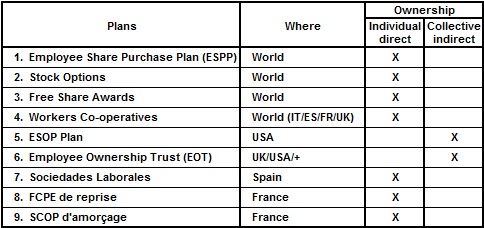|
EFES NEWSLETTER - JANUARY 2022
|
Employee
share ownership, what is it? Employee share ownership
is when employees hold a stake in the capital of the
company that employs them. It starts with one employee
holding one share and can extend up to 100% held by
all employees.
A small number of model employee share ownership plans
exist around the world (but with many variations depending
on the specific legislation of each country). These
plans are more or less adapted to startups (or micro-enterprises)
or to SMEs or large companies.
Like corporate ownership in general, employee share
ownership plans can be divided into two main categories,
individual direct and collective indirect share ownership:

Direct individual employee share ownership is the most
traditional and familiar form.. To achieve this, the
employee uses part of his or her savings or financial
resources to buy shares in the company, thus assuming
a personal risk. This is possible under various types
of plans. This category of employee share ownership
plans is virtually the only one of its kind in continental
Europe.
Indirect collective employee ownership is very little
practised in Europe (except in the UK). This explains
why employee share ownership in Europe is almost non-existent
in SMEs, and why it is almost unknown outside large
companies. Indeed, SMEs generally avoid increasing their
shareholder numbers, whether or not they are employees.
They are only forced into it when they become larger.
On the other hand, one particular phase may trigger
a desire for new shareholders: Business transmission.
That is why this is the best time to introduce employee
ownership in SMEs. Indirect collective ownership is
the most suitable form for transferring a company to
employees. Plans within this category (ESOP, EOT) have
been designed for this purpose. They allow employees
to acquire ownership of their company, often 100%, without
having to use up their savings or personal finances,
and therefore without personal risk.
Indirect collective employee ownership plans (ESOPs,
EOTs) facilitate the transfer of companies to employees,
which direct individual share ownership schemes can
only achieve with great difficulty and expense, as employee
savings are usually not up to the task.
More information
|
Press
review
We
have a selection of 30 remarkable articles in 10 countries
in December 2021: Canada, France, Germany, India, Italy, Netherlands,
Spain, UK, USA, Vietnam.
Canada:
Looking for an employee ownership trust scheme in Canada.
France: New employee share plan for Worldline, for
Veolia. Difficulties for employee ownership in startups. How
to advance employee share ownership in France?
Germany: Magic in Germany, after the entry into force
of the new legislation on July 1, 2021, the number of employee
shareholders suddenly increased by more than 50% during the
year 2020. Magic, we tell you!
India: Stock options au pays des startups.
Italy: Growing interest for employee share plans in
Italy. New employee share plan for EssilorLuxottica.
Netherlands: Anger for startups.
Spain: New information campaign on the sociedades
laborales scheme.
UK: One in 20 of all business transmissions is now
to an Employee Ownership Trust. Every day a new SME is transferred
to employees, as for instance this month: Nabco, Folio Society,
Greentech Sportsturf, Zaha Hadid Architects, HR Essentials,
RocketMill, Clear Marketing, HLM Architects.
USA: Business transmission to employees for Stubbe,
WG&R Furniture, Wells Media, Optimax. The three tools
for employee takeovers: ESOP Plan, Workers' Cooperative, Employee
Ownership Trust.
Vietnam: Employee ownership in Vietnamese style.
The full press review is available
on:
http://www.efesonline.org/PRESS
REVIEW/2021/December.htm
|
 A
political roadmap for employee ownership in Europe
A
political roadmap for employee ownership in Europe
 The
EFES needs more members. Download the EFES membership form
The
EFES needs more members. Download the EFES membership form
 What's
new on the EFES website?
What's
new on the EFES website?
 EFES NEWS
distribution: 200.000
EFES NEWS
distribution: 200.000
|